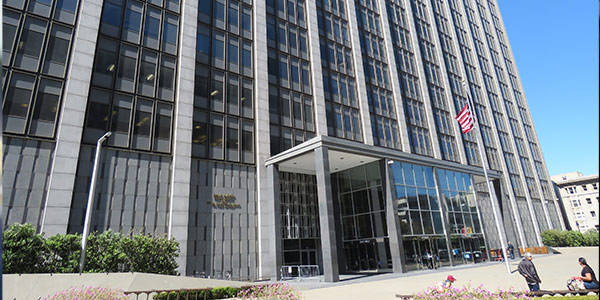By Hudson Sangree
The federal judge in charge of Pacific Gas and Electric’s Chapter 11 reorganization set a timeline for it to exit bankruptcy Tuesday and approved its recent agreement with the bondholders that had been trying to take over the state’s largest utility.
“I’m going to issue the order that … approves the [restructuring agreement with bondholders],” Montali told lawyers in the U.S. Bankruptcy Court in San Francisco. He did so despite a lone objection from wildfire survivor William Abrams, who represented himself in court and insisted that PG&E’s reorganization plan should include safety reforms.
“They are here for their short-term payouts,” Abrams said of the bondholders and other parties that have settled with PG&E. Abrams said he was looking at the long-term consequences of the restructuring agreement.
Thousands of other fire victims, represented by the case’s official Tort Claimants Committee, have agreed to a settlement with PG&E that would fund a $13.5 billion trust to pay them and government agencies that incurred costs from wildfires started by PG&E equipment in 2015, 2017 and 2018.
The catastrophic blazes included the Camp Fire, which killed 86 people and destroyed 18,804 structures in Paradise, Calif., in November 2018. And even though it denies liability, PG&E agreed to settle claims from the Tubbs Fire, which killed 22 residents and burned 5,636 structures in Napa and Sonoma counties in October 2017.
The bondholders, led by several powerful East Coast hedge funds, had offered their own reorganization plan that proposed injecting billions of dollars in cash while wiping out the equity of PG&E’s current shareholders and seizing control of the utility. The group settled with PG&E in January in exchange for the utility agreeing to pay some of its notes and to renegotiate others. (See PG&E Settles with Bondholders; Governor Objects.)
PG&E has also settled with insurance companies and other holders of subrogation claims for $11 billion and with local governments for $1 billion.
With all major stakeholder groups in agreement, Montali set a schedule Tuesday for confirmation proceedings to weigh and rule on PG&E’s plan. The process is set to begin this week with the utility filing disclosure statements that describe its plan in language the public can more easily understand. Those affected by the bankruptcy, including fire victims, will then have an opportunity to comment on and object to the disclosures.
Montali scheduled a hearing on the disclosures for March 10 and set May 27 as the start of PG&E’s confirmation hearing.
The California Public Utilities Commission must also approve PG&E’s bankruptcy plan. It opened a formal proceeding in September and scheduled evidentiary hearings starting Feb. 19 at its headquarters in San Francisco. The commission is charged with determining if the utility’s proposals meet the safety requirements of Assembly Bill 1054, a measure that creates a $21 billion wildfire insurance fund for utilities that qualify.
PG&E must exit bankruptcy by June 30 to participate in the wildfire fund.
Gov. Gavin Newsom has said that PG&E hasn’t met the requirements of AB 1054 and repeatedly threatened a state takeover of the troubled utility. Newsom remains the biggest opponent to PG&E’s reorganization plan.
Though he doesn’t have authority over the bankruptcy court, he may have sway with the CPUC. Newsom appointed the commission’s new chair, Marybel Batjer, in July, naming her at the signing ceremony for AB 1054.
PG&E recently offered a new reorganization plan that it said meets the requirements of AB 1054, but Newsom hasn’t said whether it goes far enough to satisfy his demands. (See PG&E Tries to Appease Governor with New Plan.)





